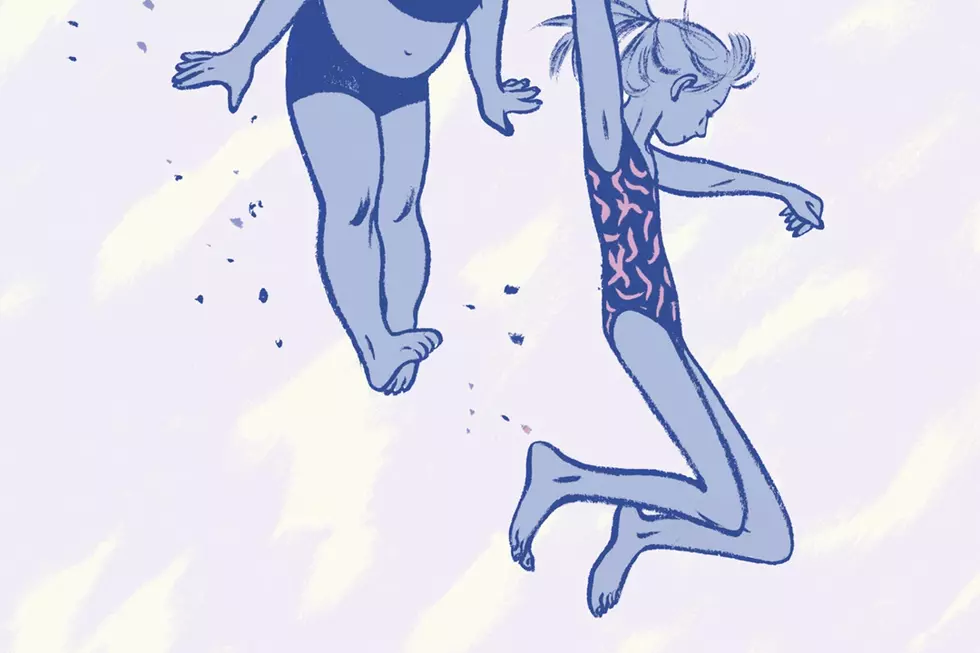
This One Summer School: Cartoonist Jillian Tamaki on ‘SuperMutant Magic Academy’
Just a few months ago, The American Library Association named Jillian Tamaki and Mariko Tamaki's This One Summer one of their Caldecott Honor books, making their original graphic novel the very first graphic novel to be so named with an honor previously only awarded to picture books for children. It was kind of a big deal.
This One Summer's artist Jillian Tamaki's next book was just released, and it's very different to her collaborations with her cousin Mariko, which also include 2008's Skim. The Drawn and Quarterly-published SuperMutant Magic Academy collects Tamaki's webcomic of the same name, featuring a cast of characters of unusual abilities, backgrounds and appearances, who all attend the same private school. What is perhaps most extraordinary about the characters --- who include fox spirit Wendy, immortal Everlasting Boy, and aggressive performance artist Frances --- is just how familiar they all are under their unfamiliar surfaces.
SMMA is a comic about a special school full of special kids, but it focuses on the parts of them that aren't special... or at least, the parts that they have in common with us. Which, of course, helps makes the comic special. Tamaki is currently touring to promote SMMA. We took the opportunity to talk to her about her work.
ComicsAlliance: I think it's safe to say that at this point a lot of readers now know you best as one half of the creative team of This One Summer. This is a very, very different book. Do you ever feel the need to warn readers that SuperMutant Magic Academy is an entirely different animal to This One Summer?
Jillian Tamaki: Um, I guess I mention it if I think it's relevant. I don't think either of those books are particularly for very young readers. It's more like I want people to know that SMMA is not a "graphic novel" in terms of an extended narrative story. It's a collection of strips. I actually first wanted it to be some weird horizontal format to reference the Calvin and Hobbes or Garfield anthology books. But [Drawn and Quarterly creative director] Tom Devlin said no.
CA: The title and the premise of SuperMutant Magic Academy immediately calls to mind the X-Men’s Xavier Institute for Gifted Youngsters and Harry Potter’s Hogwarts, which likely helped a lot of readers glom on to its online incarnation. Are you a particular fan of those works?
JT: I am not a fan. Or, rather, I know nothing about them besides maybe seeing two or three Harry Potter movies. It's a joke premise. I was being a little cheeky.
CA: Can you tell us a little bit about the process that went in to making these comics? They seem to vary in terms of style and how "finished" they look; did you create them on a self-imposed deadline that dictated how they might look?
JT: I made maybe one or two a week over the course of four years. So obviously they do have a different effect than a book where I sit down and draw the whole thing at once. It was dependent on how much time I had, what time of day, my mood, whatnot. They really are diary strips or ruminations. You can also see how they develop over the course of years. It's a portrait of a project. The aesthetics are intentionally secondary.
CA: Were you intentionally trying to subvert the fantasy elements by having fantastic characters be normal and regular teens, or was that just the sort of content you found yourself gravitating towards?
JT: I just thought it was funny. Also a send-up of the fact that everything is a derivation of everything else these days. "Oh, we're doing vampires now. Werewolves are so two years ago, etc." It's not fantastical, it's teen drama.
CA: What were your own years like in high school? Are any of the characters particularly inspired by real classmates of yours? Some of them, like Frances, for example, seem so real I think I might have gone to school with them.
JT: Not really. You know how Peanuts are only technically little kids? They're really adults? Same goes with this. The characters are inspired by my life, as someone in their thirties, my friends and relationships. And probably my experiences teaching post-secondary art school. But obviously my high school experience informs me, as it does everyone. I did not particularly enjoy high school. It seemed both too important and totally useless.
CA: Was it always your intention or ambition that the strip would be collected in book form some day?
JT: I figured it might, if I stuck with it.
CA: Do you think these strips being read all at once, in the form of a physical book, change the story in any dramatic way from how it might have been read installment at a time, on a computer screen?
JT: Yes, I think the effect is really quite different. Both modes of reading have their charms, I think. It's nice to have something you enjoy pop up in your Tumblr timeline. But I think reading them all together reveals themes or a continuity or whatever.
CA: Do you find a particular form of comics-making more enjoyable or rewarding than the other, in terms of a long-form, graphic novel style comic like This One Summer vs. a collection of strips?
JT: I enjoy both. I don't know I would start another webcomic now though. I want to take what I learned from making a webcomic and put it into longer stories. See: SexCoven, from Youth in Decline.
CA: Are you done with SuperMutant Magic Academy, or are its characters and world things you plan to, or can imagine, returning to at some point in the future?
JT: Well, never say never, but likely yes, that's the end of the SMMA.
CA: How did it feel not only to win the Caldecott, but to have produced the first graphic novel to do so?
JT: It was cool! I feel I only dip my toe in the kids book world once in a while, so to be embraced is surprising and lovely. I like librarians. They are good people.
CA: Have you paid much attention to conversations about whether graphic novels should even be considered for the prize, or do you feel rather disengaged, since it was something awarded to you guys, rather than something you actively campaigned for?
JT: Not really. I suppose I could make it my mission to be a comics crusader, and sometimes it does feel like that role gets foisted on me --- outreach to a more mainstream public --- but I kind of feel like the horse has already left the barn. I do think comics are here to stay in some way/shape/form, particularly as it relates to young readers. I think most of the controversy was about the age appropriateness? Which, on one level, I get. But I defer to librarians to determine what is appropriate for the people they serve.
CA: What do you think the odds are that SuperMutant Magic Academy also scores a Caldecott?
JT: Slim to none!
More From ComicsAlliance

![Brilliant Art, Tremendous Stories and Daring Creators: The 2016 Eisner Award Winners [SDCC 2016]](http://townsquare.media/site/622/files/2016/07/eisner2016.jpg?w=980&q=75)
![If You Love The X-Men, Read These Comics Next [Mutant Week]](http://townsquare.media/site/622/files/2016/05/X-Men-Featured.png?w=980&q=75)






